1. Overview
Glenn Edward Greenwald is an American journalist, author, and former lawyer, renowned for his pivotal role in publishing classified documents leaked by Edward Snowden in 2013, which exposed the extent of global surveillance programs by the National Security Agency (NSA). This work, primarily through The Guardian, earned him and the newspaper numerous accolades, including the Pulitzer Prize for Public Service, and significantly impacted global discourse on privacy, civil liberties, and government accountability. Greenwald's career transitioned from constitutional and civil rights law to journalism, where he became a prominent voice on issues of national security, whistleblower protection, and critical analysis of U.S. foreign policy. He co-founded the investigative news outlet The Intercept in 2014 and has continued his independent journalism through platforms like Substack and Rumble. His work has consistently challenged government overreach and advocated for transparency, often generating significant debate and controversy.
2. Early life and education
Glenn Edward Greenwald was born on March 6, 1967, in Queens, New York City, to Arlene and Daniel Greenwald. His family moved to Lauderdale Lakes, Florida, when he was an infant. His parents separated when he was six years old. Greenwald is Jewish but grew up without practicing an organized religion and did not have a bar mitzvah; he has stated that his "moral precepts aren't informed in any way by religious doctrine". He attended Nova Middle School and Nova High School in Davie, Florida.
Inspired by his grandfather's service on the Lauderdale Lakes City Council, Greenwald ran for an at-large seat on the council in 1985 at the age of 17, while still in high school. He was unsuccessful, finishing fourth with 7% of the vote. He ran again in 1991, placing third with 18% of the vote. After these experiences, he decided to focus on law school rather than pursuing political office. Greenwald has mentioned that his grandfather taught him to use his skills to challenge powerful entities.
Greenwald received a B.A. in philosophy from George Washington University in 1990. He then earned a J.D. from New York University School of Law in 1994. His experiences on his college debate team were influential in shaping his interest in advocacy and argumentation, which later guided his career choices.
3. Legal career
After graduating from law school, Glenn Greenwald began his legal career in the litigation department at the prestigious law firm Wachtell, Lipton, Rosen & Katz, where he worked from 1994 to 1995. In 1996, he co-founded his own litigation firm, Greenwald Christoph & Holland (later renamed Greenwald Christoph PC). In this capacity, he specialized in cases concerning First Amendment litigation, civil rights, and U.S. constitutional law.
Greenwald often worked pro bono (for the public good, without charge). His notable cases included representing white supremacist Matthew Hale in Illinois, whom Greenwald believed was wrongly imprisoned, and the neo-Nazi group National Alliance. Discussing his commitment to First Amendment principles, Greenwald told Rolling Stone magazine in 2013, "to me, it's a heroic attribute to be so committed to a principle that you apply it not when it's easy... not when it supports your position, not when it protects people you like, but when it defends and protects people that you hate." This stance underscored his dedication to defending free speech rights even for those with whom he profoundly disagreed.
In 2005, Greenwald voluntarily wound down his full-time litigation practice. He stated that after ten years, he found litigating full-time to be monotonous and wished to pursue other activities, such as political writing, which he felt could be more engaging and impactful.
4. Journalism career
4.1. Blog and Salon work
Greenwald began his journalism career in October 2005 with his personal blog, Unclaimed Territory. On this platform, he primarily addressed issues of national security, civil liberties, and what he viewed as governmental overreach, particularly focusing on the Plame affair, the CIA leak grand jury investigation, the federal indictment of Scooter Libby, and the NSA warrantless surveillance controversy under the George W. Bush administration. His blog quickly gained recognition, receiving the 2005 Koufax Award for "Best New Blog" in April 2006. During this period, he was noted for his critical stance against both Republicans and Democrats.
In February 2007, Greenwald became a contributing writer for Salon. His column and blog there superseded Unclaimed Territory, though Salon maintained links to his earlier work. At Salon, Greenwald continued to write extensively on topics such as the 2001 anthrax attacks investigation. He also notably opposed the potential nomination of former CIA official John O. Brennan for Director of the Central Intelligence Agency or Director of National Intelligence under the Obama administration, an opposition campaign largely led by Greenwald and other liberal bloggers that contributed to Brennan withdrawing his name from consideration at the time.
During his tenure at Salon, Greenwald described U.S. Army Private Chelsea Manning as "a whistle-blower acting with the noblest of motives" and "a national hero similar to Daniel Ellsberg" in a 2010 article. He also criticized the prison conditions Manning faced after her arrest. Rachel Maddow described Greenwald during this period as "the American left's most fearless political commentator."

4.2. The Guardian and NSA surveillance disclosure
4.2.1. Contact with Edward Snowden and disclosure process
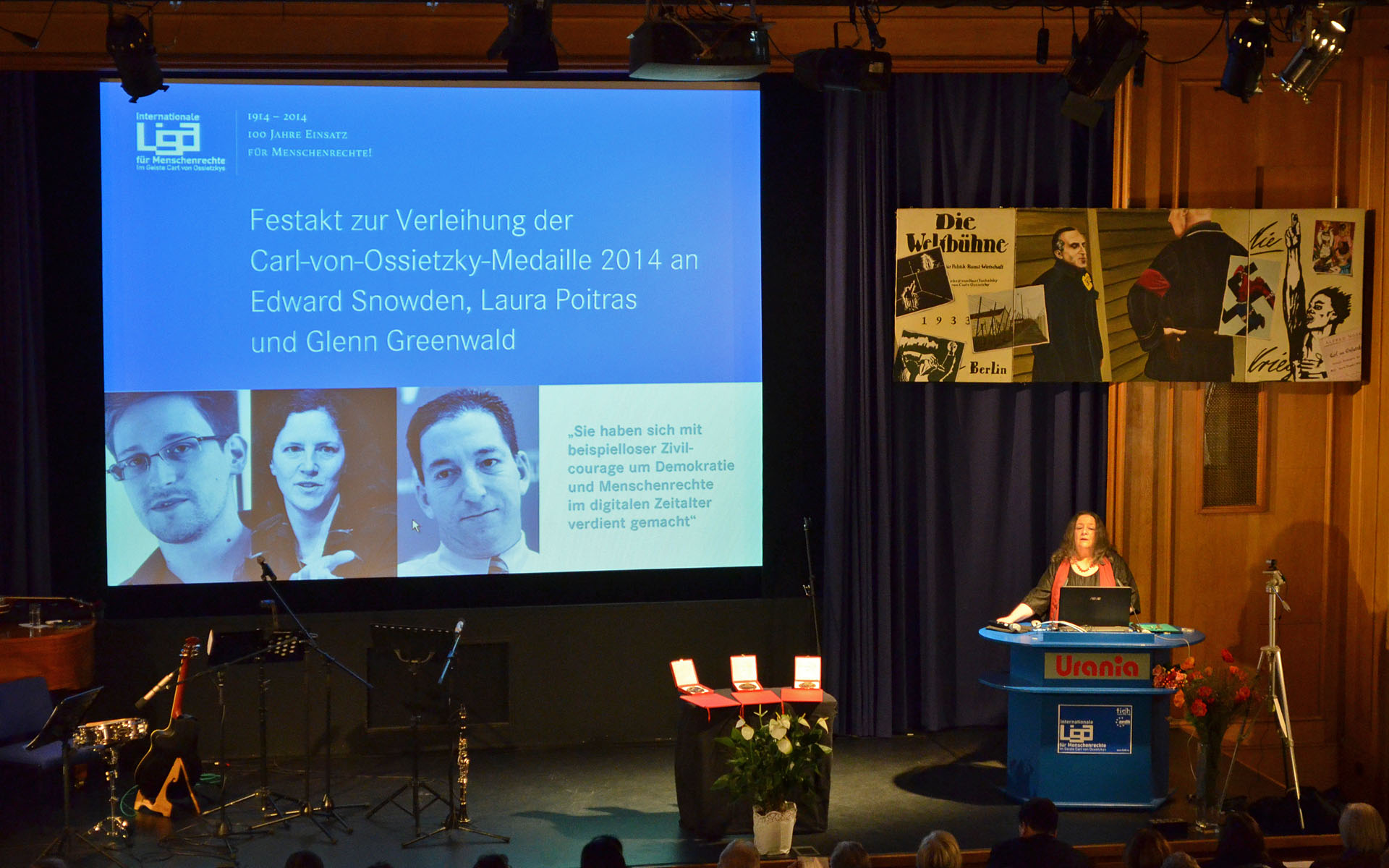
In late 2012, Glenn Greenwald was first contacted anonymously by Edward Snowden, a former National Security Agency (NSA) contractor. Snowden, using the pseudonym "Cincinnatus," indicated he had sensitive documents to share and urged Greenwald to install Pretty Good Privacy (PGP) encryption software for secure communication. Greenwald, finding the technical measures cumbersome and being busy, did not initially install PGP, and communication stalled.
Snowden then contacted documentary filmmaker Laura Poitras in January 2013. According to The Guardian, Snowden was drawn to Greenwald and Poitras partly due to a Salon article by Greenwald about how Poitras's films had made her a "target of the government." In April 2013, Poitras arranged a meeting between herself and Greenwald in New York City, at which point Snowden began providing documents to both of them through Poitras. After Greenwald installed the necessary security software, including Off-the-Record Messaging, Snowden shared initial documents, including information on the PRISM program.
Recognizing the gravity of the information, Greenwald, Poitras, and Guardian journalist Ewen MacAskill flew to Hong Kong in early June 2013 to meet Snowden in person. It was there that Snowden revealed his identity. The first major story based on Snowden's documents was published in The Guardian on June 5, 2013. Authored by Greenwald, it revealed a top-secret Foreign Intelligence Surveillance Court (FISC) order requiring Verizon to provide the NSA with telephone metadata for all calls within the U.S. and between the U.S. and other countries. This was followed by numerous other reports detailing the vast scope of global surveillance programs run by the NSA and its allies, such as the British GCHQ. Greenwald stated that Snowden's documents exposed the "scale of domestic surveillance under Obama."
The disclosures triggered a worldwide debate on mass surveillance, privacy, and national security. In September 2021, Yahoo! News reported that in 2017, following the publication of the Vault 7 files, top U.S. intelligence officials had lobbied the White House to designate Greenwald as an "information broker," potentially to enable more aggressive investigative measures against him, but the White House rejected this. Greenwald responded, "I am not the least bit surprised that the CIA, a longtime authoritarian and antidemocratic institution, plotted to find a way to criminalize journalism and spy on and commit other acts of aggression against journalists."
4.2.2. International repercussions and testimony
The disclosure of NSA surveillance programs by Glenn Greenwald, based on documents provided by Edward Snowden, had profound international repercussions, sparking global debates on privacy, national sovereignty, and the balance between security and civil liberties. Governments around the world reacted to the revelations, with some expressing outrage at U.S. spying activities targeting their citizens and leaders.
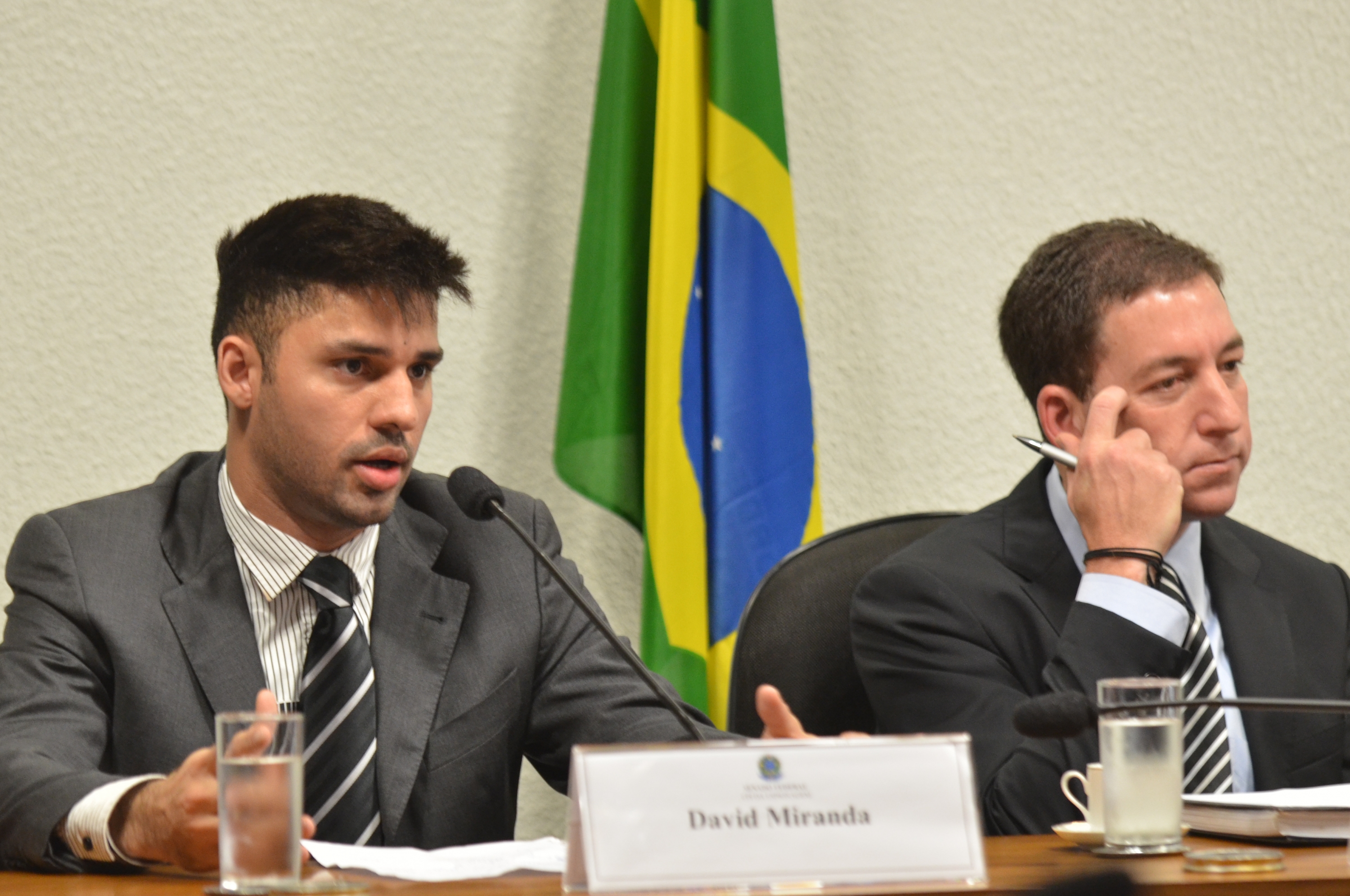
In August 2013, Greenwald testified before the National Congress of Brazil. He stated that the U.S. government had used counterterrorism as a pretext for clandestine surveillance, not only for security purposes but also to gain competitive advantages in "business, industrial and economic fields" against other countries. This testimony was particularly relevant as documents had revealed extensive NSA spying on Brazilian citizens, corporations like Petrobras, and even then-President Dilma Rousseff.
On December 18, 2013, Greenwald addressed the Committee on Civil Liberties, Justice and Home Affairs of the European Parliament via video link. He criticized many governments for "turning their backs on Edward Snowden" and their ethical responsibilities. He specifically highlighted the role of the British intelligence agency GCHQ, stating, "It is the UK through their interception of underwater fibre optic cables, that is a primary threat to the privacy of European citizens when it comes to their telephone and emails." In a written statement to the Parliament, Greenwald asserted that the "ultimate goal of the NSA, along with its most loyal, one might say subservient junior partner the British agency GCHQ... is nothing less than the elimination of individual privacy worldwide."
These testimonies and the ongoing reporting contributed to diplomatic tensions, reviews of intelligence sharing agreements, and calls for stronger data protection laws in several countries. The disclosures also fueled movements advocating for greater transparency and oversight of intelligence agencies globally. Greenwald left The Guardian on October 15, 2013, to pursue a new media venture.
4.3. Founding of The Intercept and work
In 2014, Glenn Greenwald co-founded the investigative journalism outlet The Intercept along with Laura Poitras and Jeremy Scahill. The venture was financially backed by eBay founder Pierre Omidyar, who stated his "rising concern about press freedoms in the United States and around the world" as a motivation for his investment. Omidyar's organization, First Look Media, launched The Intercept as its first online publication on February 10, 2014. Greenwald, Poitras, and Scahill served as its initial editors. The Intercept was established as a 501(c)(3) tax-exempt charitable entity.
The platform was created to support independent journalism and provide a space for adversarial reporting, particularly on issues of national security, surveillance, and government accountability, continuing the work Greenwald had become known for with the Snowden disclosures. During the 2016 presidential campaign, The Intercept reportedly had contact with Guccifer 2.0, an entity U.S. intelligence agencies attributed to Russian intelligence, which relayed some hacked materials related to Hillary Clinton. Counterintelligence specialist "The Grugq" noted in October 2016 that The Intercept was aware of the source's attribution to Russian intelligence services.
By 2019, Greenwald's role had shifted to that of a columnist without direct editorial control over the site's news reporting. His tenure at The Intercept was marked by significant reporting but also by internal disagreements that eventually led to his departure.
4.4. Activities after resigning from The Intercept
Glenn Greenwald resigned from The Intercept on October 29, 2020. He cited political censorship and contractual breaches by the editors as his reasons, claiming they had prevented him from publishing an article critical of then-presidential candidate Joe Biden's conduct concerning Ukraine and China, and had demanded he not publish it elsewhere. The Intercepts editor-in-chief, Betsy Reed, disputed Greenwald's accusations, stating that his article was more akin to "dubious claims by the Trump campaign" presented as journalism, and denied censorship. Greenwald subsequently published his article on Joe Biden and his correspondence with The Intercepts editors on his own.
After leaving The Intercept, Greenwald began publishing his reporting and commentary independently on Substack, an online, subscriber-based newsletter platform. By June 2023, he had reportedly amassed over 295,000 subscribers on the platform.
In 2023, Greenwald announced he would host System Update, a nightly, one-hour live program on Rumble, a video-hosting platform known for its appeal to conservative audiences. System Update features monologues on topical political issues, often focusing on media criticism and developments within the American security state, as well as interviews with a variety of guests. Notable guests have included academics like Jeffrey Sachs and John Mearsheimer, figures like Edward Snowden and Robert F. Kennedy Jr., and journalists such as Lee Fang and Matt Taibbi. Concurrently with his move to Rumble for video content, Greenwald began republishing his Substack written work on Locals, Rumble's subscription-based community platform.
Greenwald has been a frequent guest on Fox News, particularly on Tucker Carlson Tonight. He has claimed that MSNBC banned him from appearing on their network due to his criticisms of Rachel Maddow and the network's coverage of Russian interference in the 2016 U.S. election, a claim MSNBC has denied.
4.5. Vaza Jato (Operation Car Wash leaks in Brazil)
In June 2019, Glenn Greenwald, along with journalists from The Intercept Brasil, where he was an editor, began publishing a series of leaked Telegram messages related to Operation Car Wash (Operação Lava JatoOperation Car WashPortuguese), a massive anti-corruption investigation in Brazil. This series of leaks became known as Vaza Jato (Car Leaks). The messages appeared to show improper collusion between members of the Brazilian judiciary and the Lava Jato task force, including then-judge (and later Minister of Justice) Sérgio Moro and lead prosecutor Deltan Dallagnol. The leaks suggested that Moro had acted prejudicially against former President Luiz Inácio Lula da Silva (Lula) in the investigation and trial that led to Lula's imprisonment, allegedly with the objective of preventing Lula from running in the 2018 Brazilian general election. Reports also indicated involvement of the FBI in Operation Car Wash. Newspapers like Folha de S.Paulo and magazine Veja later confirmed the authenticity of some messages and partnered with The Intercept Brasil to report on the extensive archive.
The source of the leaks was later identified as Walter Delgatti Neto, a hacker from Araraquara, who was arrested by Brazilian Federal Police in July 2019. Delgatti confessed to hacking the Telegram accounts of authorities and providing the chat logs to Greenwald. The Intercept Brasil did not confirm or deny Delgatti as their source, citing freedom of the press protections under the Brazilian Constitution.
The Vaza Jato reporting had an explosive impact on Brazilian politics. Greenwald faced significant pressure from the Brazilian government under President Jair Bolsonaro. He received death threats and homophobic harassment from Bolsonaro supporters. Bolsonaro himself threatened Greenwald with imprisonment. The Washington Post reported that Greenwald was targeted with fiscal investigations by the Bolsonaro government, allegedly in retaliation for the reporting. AP called Greenwald's reporting "the first test case for a free press" under Bolsonaro.
In August 2019, Supreme Court Justice Gilmar Mendes ruled that any investigation of Greenwald related to the Vaza Jato reporting would be illegal under the Brazilian constitution, citing press freedom as a "pillar of democracy." Despite this, in January 2020, Brazilian federal prosecutors charged Greenwald with cybercrimes, alleging he was part of a "criminal organization" that hacked cellphones and that he played a "clear role in facilitating the commission of a crime," for instance, by encouraging hackers to delete archives. Greenwald denied the charges, calling them an "obvious attempt to attack a free press." The charges were widely condemned by press freedom organizations. In February 2020, a federal judge dismissed the charges against Greenwald, citing the earlier Supreme Court ruling by Justice Mendes that shielded him due to his journalistic activities.
In November 2019, Greenwald was physically attacked by Brazilian journalist Augusto Nunes during a live radio program after Greenwald called Nunes a "coward" for previously suggesting a family judge should take away Greenwald's adopted children.
5. Political views
5.1. Criticism of U.S. politics and foreign policy
Glenn Greenwald has been a consistent and vocal critic of the policies of multiple U.S. administrations, including those of George W. Bush, Barack Obama, and Donald Trump, particularly concerning infringements on civil liberties, U.S. military interventions, and mass surveillance. He argued that the Bush administration used the September 11 attacks as a pretext to erode constitutional rights and that most American "corporate news media" largely excused these policies and echoed the administration's positions rather than engaging in critical journalism. Greenwald accused mainstream U.S. media of "spreading patriotic state propaganda".
During the Trump administration, Greenwald criticized what he saw as the Democratic Party's hypocrisy, stating, "Democrats didn't care when Obama hugged Saudi despots, and now they pretend to care when Trump embraces Saudi despots or Egyptian ones." While critical of Trump, saying "I think the Trump White House lies more often...more readily...more blatantly," he also directed significant criticism towards those he perceived as overly focused on Trump to the exclusion of systemic issues.
Greenwald expressed significant skepticism regarding the U.S. intelligence community's assessment, led by James Clapper, that the Russian government interfered in the 2016 U.S. presidential election to benefit Donald Trump. He questioned the certainty and significance of the allegations, often arguing that such interference, even if true, was comparable to U.S. actions in other countries ("This is stuff we do to them, and have done to them for decades, and still continue to do."). He viewed the intense focus on "Russiagate" as a distraction from more pressing domestic issues and as a form of "jingoistic fear-mongering." After the release of the Mueller report, Greenwald contended that the investigation was "a scam and a fraud from the beginning" and heavily criticized media outlets like MSNBC for their coverage, claiming they had lied to the public for years. He stated he was formally banned from appearing on MSNBC for these criticisms, a claim MSNBC denied. His skepticism about Russian interference was criticized by figures such as Susan Hennessey and Tamsin Shaw, who argued he was downplaying significant evidence.
5.2. Israeli-Palestinian conflict

Glenn Greenwald has consistently maintained a critical stance on the Israeli government's policies towards Palestinians and the broader Israeli-Palestinian conflict. He has been particularly outspoken regarding the Israeli occupation of the West Bank and the conditions in the Gaza Strip. His criticisms extend to what he perceives as the undue influence of the Israel lobby on U.S. politics and foreign policy.
In May 2016, Greenwald accused The New York Times of "abject cowardice" and "journalistic malfeasance" for initially using quotation marks around the word "occupation" in reference to Gaza, suggesting it was done "out of fear of the negative reaction by influential factions." Following his public criticism, The New York Times removed the quotation marks from the article in question.
After the Charlie Hebdo shooting in January 2015, David Bernstein, writing in The Washington Post, criticized an article by Greenwald in The Intercept. Bernstein suggested Greenwald appeared to equate "Der Stürmer-like anti-Semitic cartoons" with cartoons mocking Moses or Muhammed, implying Greenwald was downplaying the unique nature of antisemitic caricatures while defending the right to publish controversial content. Greenwald's article had aimed to critique what he saw as selective outrage over blasphemy and to defend broad freedom of speech principles, even for offensive material.
5.3. Julian Assange and WikiLeaks
Glenn Greenwald has been a staunch defender of WikiLeaks founder Julian Assange and a vocal critic of the U.S. government's efforts to prosecute him. He views the case against Assange, particularly the charges under the Espionage Act of 1917 for publishing classified documents, as a grave threat to freedom of the press and investigative journalism worldwide.
Greenwald has argued that the act of publishing classified information provided by whistleblowers is a core function of journalism and that criminalizing Assange's activities sets a dangerous precedent that could be used against any journalist or news organization publishing government secrets. In May 2019, writing for The Washington Post, Greenwald stated, "The Trump administration has undoubtedly calculated that Assange's uniquely unpopular status across the political spectrum [in the United States] makes him the ideal test case for creating a precedent that criminalizes the defining attributes of investigative journalism."
He has also been critical of media coverage of Assange. For instance, when The Guardian published a story in November 2018, citing anonymous sources, claiming that former Trump campaign manager Paul Manafort held secret meetings with Assange in the Ecuadorian embassy, Greenwald strongly contested the report's veracity. He argued that if such visits had occurred, there would be evidence from surveillance cameras around the embassy, and described The Guardian's reporting on Assange as driven by "a pervasive and unprofessionally personal hatred for Julian Assange that it has frequently dispensed with all journalistic standards in order to malign him."
5.4. Brazilian politics (Criticism of Jair Bolsonaro)
Glenn Greenwald has been a prominent and outspoken critic of former Brazilian President Jair Bolsonaro and his administration's policies, particularly concerning human rights, freedom of the press, environmental protection, and democratic norms. Living in Brazil, Greenwald offered on-the-ground perspectives on Bolsonaro's rise and governance.
In October 2018, prior to Bolsonaro's election, Greenwald characterized him as far more extreme than often depicted in Western media, comparing him to figures like Philippine President Rodrigo Duterte or Egyptian President Abdel Fattah el-Sisi in terms of his beliefs and potential actions. He warned about Bolsonaro's support for dictatorships and torture. After Bolsonaro's election, Greenwald noted that Bolsonaro could be a "good partner" for then-U.S. President Donald Trump if the U.S. aimed to reassert influence in Latin America akin to the Monroe Doctrine, as suggested by figures like John R. Bolton.
Greenwald's criticism intensified following the Vaza Jato leaks published by The Intercept Brasil in 2019, which implicated Bolsonaro's then-Justice Minister Sérgio Moro in alleged judicial misconduct. This reporting led to direct threats against Greenwald from President Bolsonaro, who suggested Greenwald could be imprisoned. Greenwald and his husband, then-Congressman David Miranda, also faced homophobic harassment from Bolsonaro supporters. The Brazilian Association of Investigative Journalism condemned Bolsonaro's threats.
The pressure culminated in Brazilian federal prosecutors charging Greenwald with cybercrimes in January 2020, alleging he was part of a "criminal organization" that hacked officials' cellphones. Greenwald called the charges an "obvious attempt to attack a free press." The charges were dismissed by a federal judge in February 2020, citing press freedom protections.
5.5. Views on other key issues
Beyond his primary focus on U.S. politics, surveillance, and Brazilian affairs, Glenn Greenwald has expressed views on a range of other social and international issues.
Immigration: In 2005, early in his blogging career, Greenwald wrote critically about illegal immigration, expressing concerns that it could lead to a "parade of evils" and that large numbers of illegal immigrants could not be assimilated and would "wreak havoc." He subsequently disavowed these earlier views, stating in 2011 that the post was written three weeks after he began blogging and that his perspective had evolved.
Animal Rights and Veganism: Greenwald is a vegan and a vocal advocate for animal rights. He and his late husband, David Miranda, were known for rescuing numerous stray dogs, at one point owning 24. In 2017, Greenwald announced plans to build an animal shelter in Brazil for stray pets, which would be staffed by homeless individuals. He has spoken and written about the ethical imperative of veganism and has supported animal rights activism.
2022 Russian invasion of Ukraine: In the context of the 2022 Russian invasion of Ukraine, Greenwald has been critical of U.S. and Western policy towards the conflict. He appeared on Tucker Carlson Tonight where he discussed the Ukraine biolabs conspiracy theory, highlighting statements by U.S. officials like Victoria Nuland regarding "biological research facilities" in Ukraine and concerns that Russia might seize them. Critics have characterized this as an endorsement of a disinformation campaign. In 2022, the Security Service of Ukraine (SBU) reportedly placed Greenwald on a list of public figures alleged to promote Russian propaganda, a move Greenwald and his supporters condemned as an attempt to silence dissenting voices.
6. Reception and impact
6.1. Influence on journalism and society
Glenn Greenwald's reporting on the National Security Agency (NSA) surveillance programs, based on documents leaked by Edward Snowden in 2013, had a profound influence on journalism and society worldwide. This work, primarily published in The Guardian, catalyzed global debates on the balance between national security and individual privacy rights. It brought the vast scope of government surveillance into public consciousness, revealing how intelligence agencies were collecting massive amounts of data on citizens globally.
The disclosures led to increased public awareness and scrutiny of intelligence agencies' practices, prompting calls for reform and greater oversight. In several countries, governments initiated reviews of their surveillance laws and practices. The reporting also reignited discussions about whistleblower protection and the ethical responsibilities of journalists when handling classified information. Greenwald's adversarial approach to journalism, characterized by a deep skepticism of government claims and a focus on holding power accountable, became a model for some, while also drawing criticism from others who found it overly combative or biased.
His work contributed to policy changes in some areas, including limitations on certain surveillance programs and enhanced data protection measures. Furthermore, it fostered a broader conversation about the role of encryption and digital security tools for individuals and organizations seeking to protect their communications. The impact of Greenwald's reporting is evident in the numerous awards he and his colleagues received, including the Pulitzer Prize for Public Service, underscoring its significance in promoting government accountability and defending civil liberties.
6.2. Criticism and controversies
Glenn Greenwald's work and public persona have been subject to various criticisms and controversies throughout his career. While his proponents laud him as a fearless defender of civil liberties and a champion of adversarial journalism, critics have raised concerns about his methods, perceived biases, and the impact of some of his stances.
One common line of criticism revolves around his journalistic approach, which some describe as advocacy journalism rather than objective reporting. His strong, often polemical, writing style and his deep skepticism of U.S. government institutions have led some to accuse him of lacking impartiality.
His reporting on the Edward Snowden leaks, while widely acclaimed, also drew criticism from some government officials and commentators who argued that the disclosures harmed national security. For example, then-Congressman Peter T. King suggested Greenwald should be arrested, and journalist Andrew Ross Sorkin initially stated he would "almost arrest Glenn Greenwald" before apologizing.
Greenwald's skepticism regarding Russian interference in the 2016 United States elections ("Russiagate") became a significant point of contention. Critics, such as Tamsin Shaw in The New York Review of Books and Susan Hennessey, argued he was downplaying substantial evidence and aligning with narratives beneficial to the Trump administration or Russian interests. His frequent appearances on conservative media outlets like Fox News, particularly Tucker Carlson Tonight, further fueled criticism from some on the left, who saw it as an endorsement of right-wing figures or an indication of a political shift. Greenwald defended these appearances as a way to reach a broader audience and critique mainstream liberal media.
His resignation from The Intercept in 2020, citing censorship over an article critical of Joe Biden, was also controversial. While Greenwald framed it as a defense of journalistic independence, editors at The Intercept disputed his account, stating his piece did not meet editorial standards and resembled campaign talking points.
Some commentators, like Sean Wilentz and Max Boot, have characterized Greenwald's political positions as sometimes aligning with a convergence of far-left and far-right views, particularly on issues of foreign policy and skepticism of established institutions. His views on the 2022 Russian invasion of Ukraine, including his discussion of the Ukraine biolabs conspiracy theory, have also drawn sharp criticism.
6.3. Awards and recognition
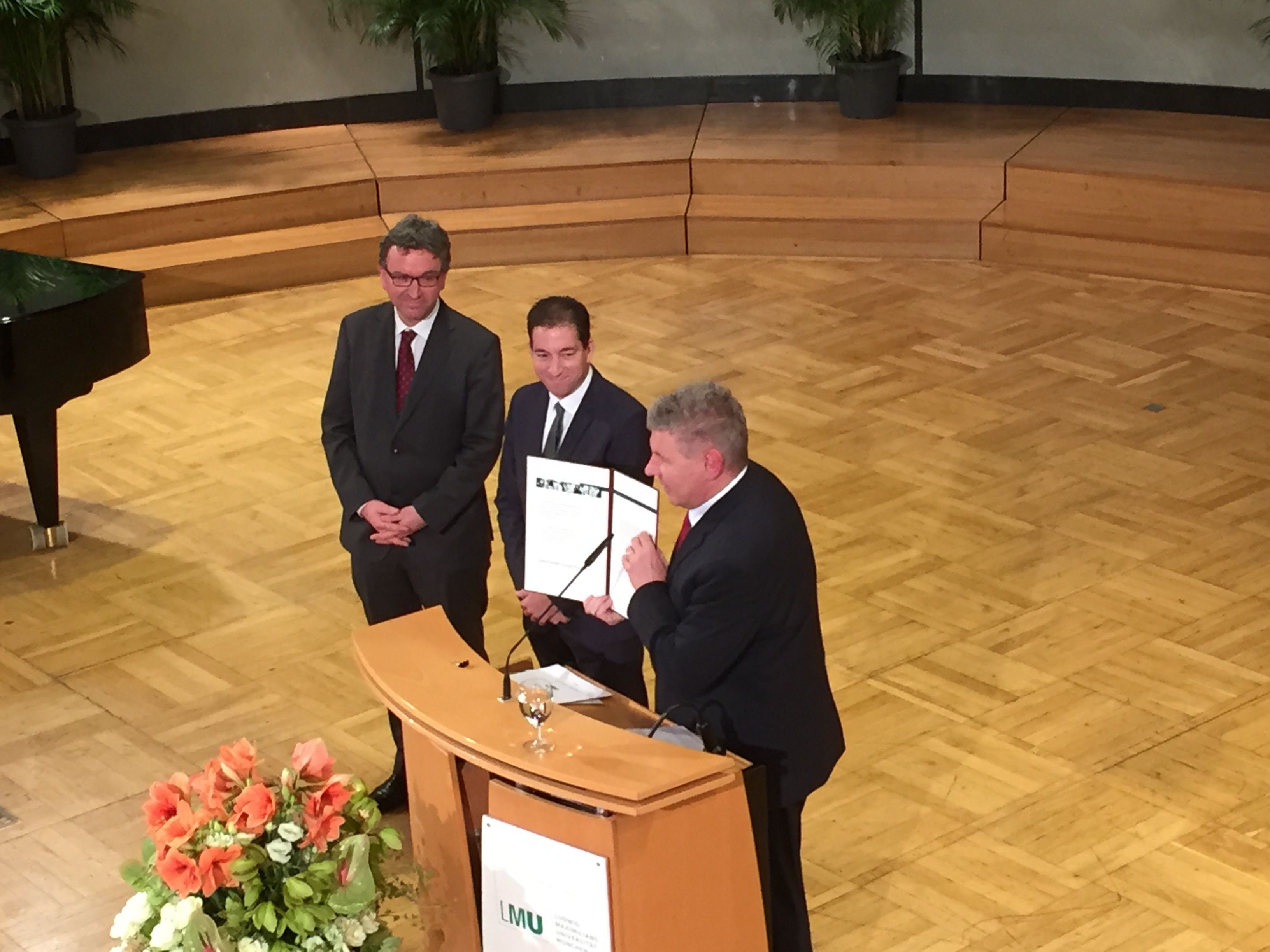
Glenn Greenwald has received numerous awards and significant international recognition for his work as a journalist and author. His reporting on the National Security Agency (NSA) global surveillance programs, based on documents leaked by Edward Snowden, garnered particular acclaim.
Key awards and recognitions include:
- Pulitzer Prize for Public Service (2014):** Awarded jointly to The Guardian and The Washington Post for their reporting on the NSA disclosures. Greenwald was a leading journalist for The Guardian's team.
- George Polk Award for National Security Reporting (2013):** For his NSA reporting. He accepted the award in person in New York in April 2014, his first return to the U.S. since the Snowden stories broke.
- Izzy Award for Special Achievement in Independent Media (2009):** Shared with Amy Goodman, this was the inaugural Izzy Award.
- Online Journalism Award for Best Commentary (2010):** For his investigative work on the conditions of Chelsea Manning.
- Esso Award for Excellence in Reporting (Brazil, 2013):** For his articles in O Globo on NSA mass surveillance of Brazilians. He was the first foreigner to win this award.
- Libertad de Expresión Internacional Award (Argentina, 2013):** From the magazine Perfil.
- EFF Pioneer Award (2013):** For his coverage and analysis of the 2013 mass surveillance disclosures.
- Geschwister-Scholl-Preis (Germany, 2014):** A German literary award for the German edition of his book No Place to Hide.
- McGill Medal for Journalistic Courage (2014):** From the Henry W. Grady College of Journalism and Mass Communication at the University of Georgia.
- Foreign Policy Magazine's Top 100 Global Thinkers (2013).**
- Newsweek Magazine's Top Ten Opinionists in America (2012).**
His work has been featured in lists of top columnists by various publications. The documentary Citizenfour, which chronicled his work with Snowden and Laura Poitras, won the 2014 Academy Award for Best Documentary Feature. Greenwald appeared on stage with Poitras to accept the award.
7. Personal life
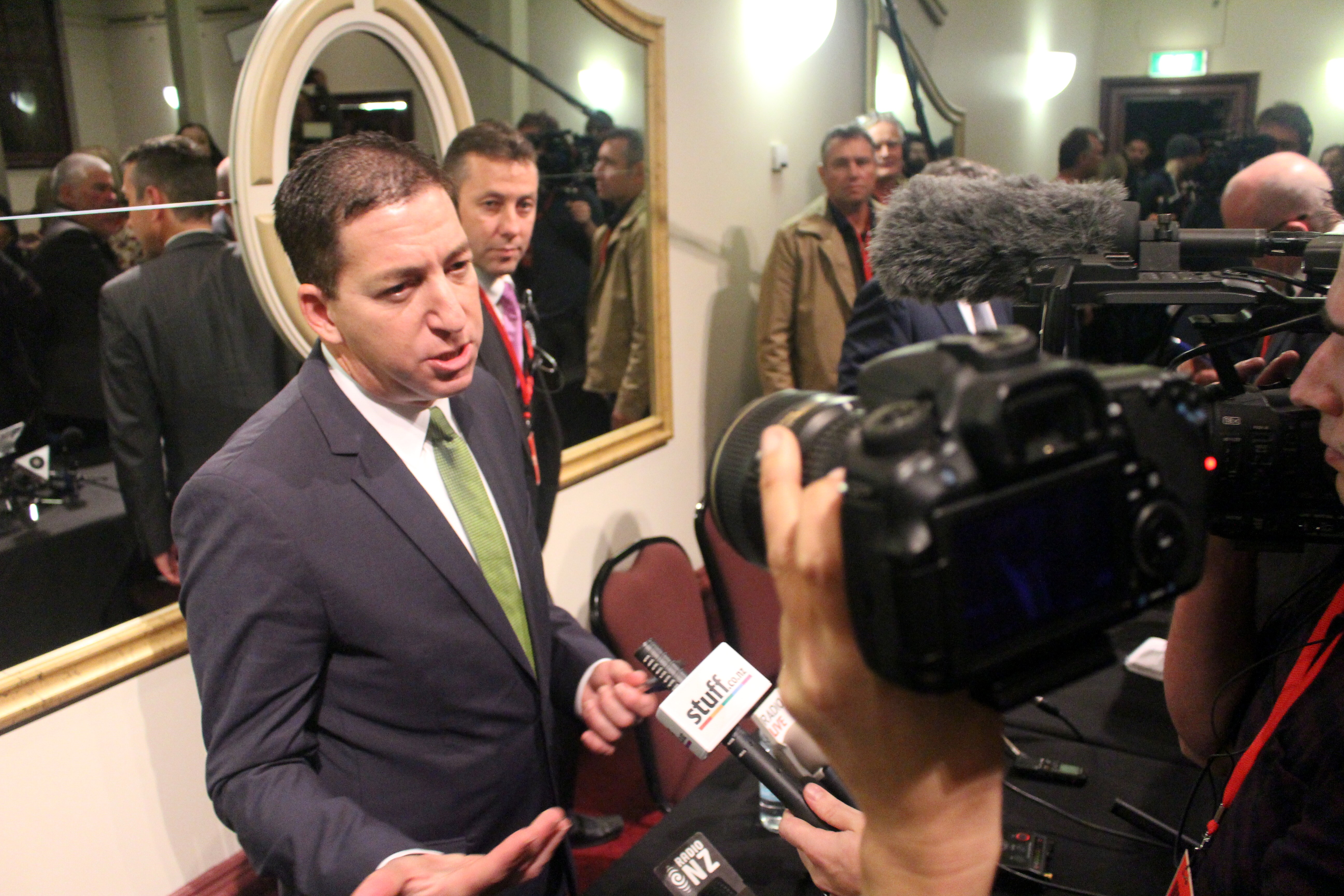
Glenn Greenwald has resided in Rio de Janeiro, Brazil, since 2005. That year, at age 38, while on vacation, he met David Miranda, then 19, who had grown up in the Jacarezinho favela. They began living together shortly after meeting and later married. Greenwald stated that one reason for living in Brazil was that the U.S. Defense of Marriage Act (prior to its overturning) prevented federal recognition of same-sex marriage, which would have hindered Miranda's ability to obtain a visa to live with him in the United States.
In 2017, Greenwald and Miranda announced they had gained legal guardianship of two brothers from Maceió, a city in Northeastern Brazil. They formally adopted the boys in 2018. David Miranda became a politician, serving as a congressman for the left-wing PSOL party and later the PDT party. Greenwald and Miranda were close friends with Brazilian human rights advocate and politician Marielle Franco, who was assassinated in 2018.
Tragically, David Miranda died on May 9, 2023, at the age of 37, after a nine-month stay in an ICU due to a gastrointestinal infection. Greenwald announced his husband's passing on Twitter.
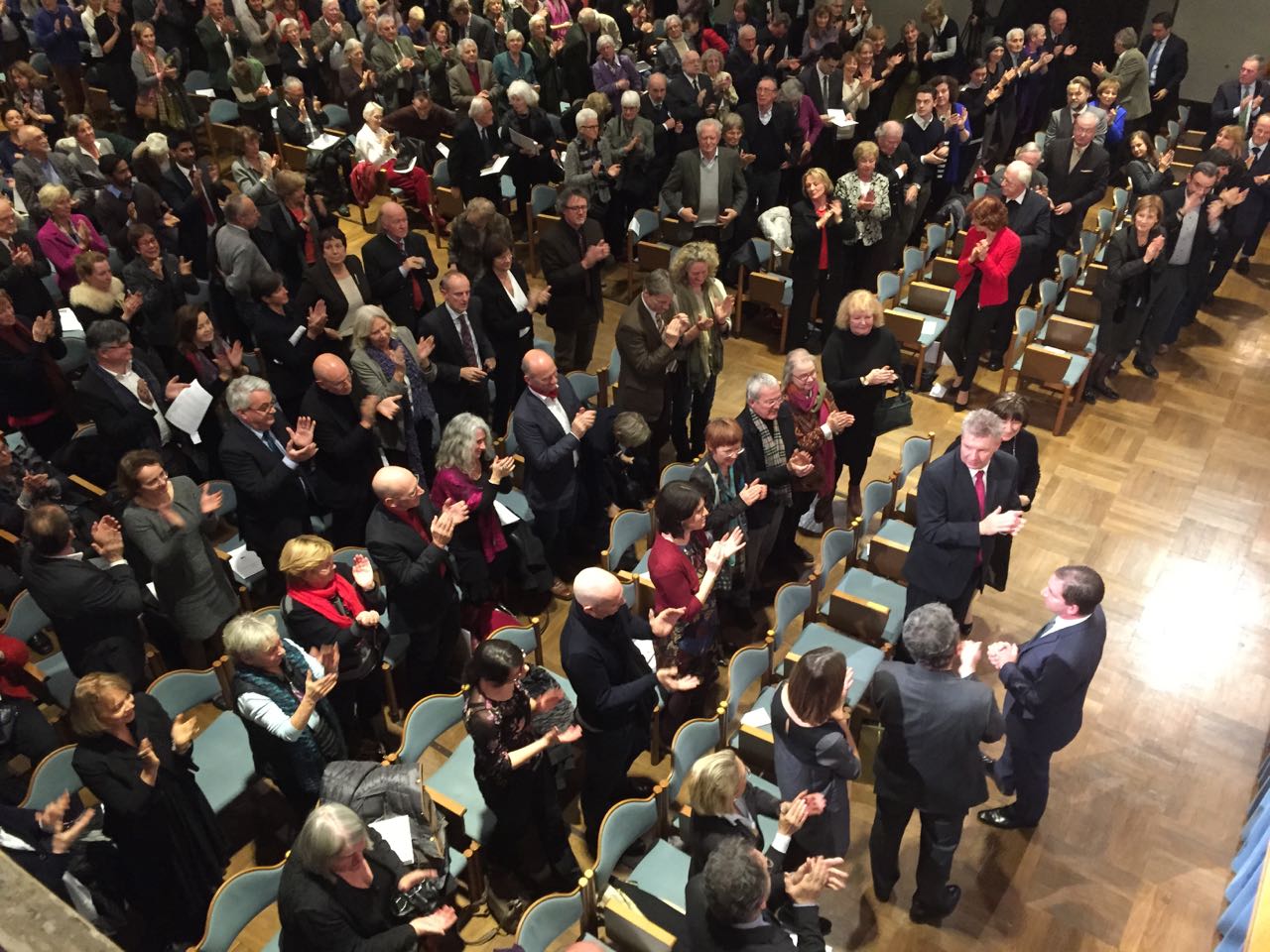
Greenwald is a devoted advocate for animal rights and is a vegan. He and Miranda were known for rescuing numerous stray dogs, at one point caring for 24. In 2017, they announced plans to build an animal shelter in Brazil for stray pets, which would be staffed by homeless individuals.
Regarding his religious views, Greenwald does not participate in any organized religion. He has stated that he believes in "the spiritual and mystical part of the world" and finds yoga to be "like a bridge into that." He has been critical of the New Atheism movement, particularly figures like Sam Harris and their criticism of Islam.
8. Major works
Glenn Greenwald is the author of several influential books, many of which became New York Times bestsellers. His writings primarily focus on U.S. politics, civil liberties, government surveillance, foreign policy, and the abuse of power.
- How Would a Patriot Act? Defending American Values From a President Run Amok (2006): Greenwald's first book, it critically examined the USA PATRIOT Act and the expansion of executive power under the George W. Bush administration in the wake of the September 11 attacks. It argued that these measures undermined core American values and civil liberties. The book became a New York Times bestseller.
- A Tragic Legacy: How a Good vs. Evil Mentality Destroyed the Bush Presidency (2007): This work continued Greenwald's critique of the Bush presidency, focusing on how a simplistic "good versus evil" worldview led to detrimental foreign and domestic policies. It also achieved New York Times bestseller status.
- Great American Hypocrites: Toppling the Big Myths of Republican Politics (2008): In this book, Greenwald challenged what he perceived as hypocrisies and myths propagated by the Republican Party and conservative movement in the United States.
- With Liberty and Justice for Some: How the Law Is Used to Destroy Equality and Protect the Powerful (2011): This book explored how the American legal and political system disproportionately benefits the powerful and well-connected while often failing to deliver justice and equality for ordinary citizens. It highlighted a two-tiered system of justice.
- No Place to Hide: Edward Snowden, the NSA, and the U.S. Surveillance State (2014): Perhaps his most famous work, this book provides a detailed, first-hand account of his collaboration with Edward Snowden to expose the National Security Agency's (NSA) global surveillance programs. It delves into the methods of contact, the process of publishing the classified documents, the global impact of the revelations, and the broader implications for privacy and democracy in the digital age. No Place to Hide was an international bestseller and was named one of the ten Best Non-Fiction Books of 2014 by The Christian Science Monitor.
- Securing Democracy: My Fight for Press Freedom and Justice in Bolsonaro's Brazil (2021): This book chronicles Greenwald's experiences publishing the Vaza Jato leaks through The Intercept Brasil, which exposed alleged corruption and misconduct within Brazil's justice system, including by then-Justice Minister Sérgio Moro. It details the intense political pressure and retaliation he and his family faced from the Bolsonaro government and its supporters, framing his efforts as a fight for freedom of the press and democratic accountability in Brazil.